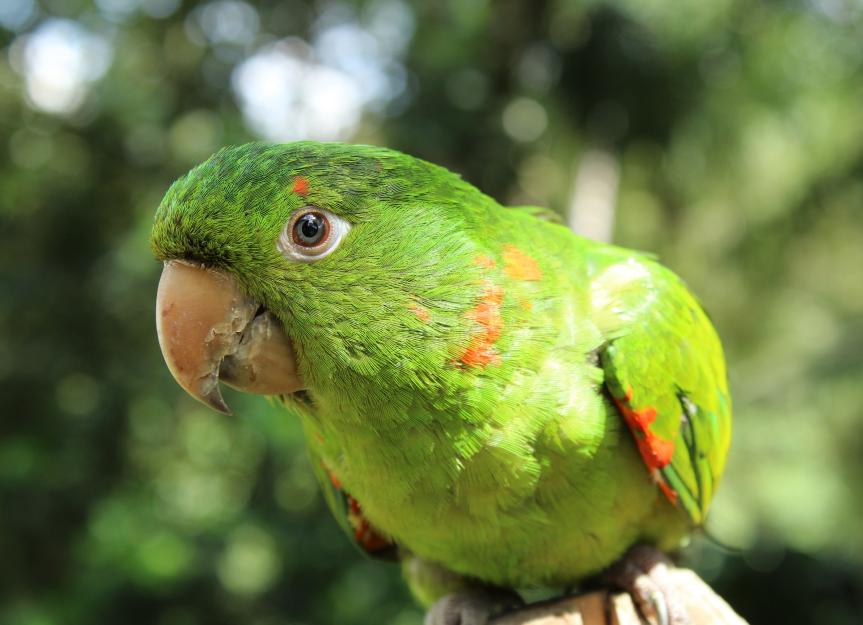This is all a very quick skim because I'm supposed to be doing my actual work, haha. I am an academic researcher but not in sciences so while I'm pretty good at finding research papers, I don't have a good sense of whether the research itself is any good or not.
This is the researcher they cite - David Phalen at the University of Sydney, Australia:
Staff Profile
This is the research paper:
Phalen, D. (2005). Diagnosis and Management of
Macrorhabdus ornithogaster (Formerly Megabacteria).
Veterinary Clinics of North America: Exotic Animal Practice, 8(2),pp. 299-306
Available at:
https://www.sciencedirect.com/science/article/abs/pii/S109491940400091X?via=ihub
My university doesn't subscribe to the journal in question, but I did find this article which cites it:
João Brandão, Hugues Beaufrère (2013) Clinical Update and Treatment of Selected Infectious Gastrointestinal Diseases in Avian Species.
Journal of Exotic Pet Medicine, 22(2) pp. 101-117,
Available at:
https://www.sciencedirect.com/science/article/pii/S1557506313000591#bib100
I skimmed the article. The bit that interested me is this quote:
In another study, optimal in vitro growth of this organism [M. ornithogaster] was achieved at a pH of 3 to 4
It cites this article in support:
Y. Hannafusa, A. Bradley, E.E. Tomaszewski,
et al. (2007) Growth and metabolic characterization of
Macrorhabdus ornithogaster. J Vet Diagn Invest, 19, pp. 256-265
Available at:
https://journals.sagepub.com/doi/full/10.1177/104063870701900305
I was able to obtain this article. This article describes optimum growth conditions for
M. ornithogaster. To put it in layman's terms, it's difficult to grow
M. ornithogaster outside a body. The research article describes the process of trying to identify lab conditions under which
M. ornithogaster can be successfully cultured. the researchers set up different "environments" to culture
M. ornithogaster to see what kind of conditions (like growth medium, food source, pH etc) best supported its growth. The key thing here is the pH value of 3 and 4, with minimal growth occuring at pH 1 (too acidic) and pH 5 and 6 (insufficiently acidic).
This chimes in nicely with what
@Mizzely found: that conditions in the crop are potentially already ideal to support
M. ornithogaster growth.
From my understanding of biochemistry, bodies are exquisitely sensitive to change. If the pH of the crop (or stomach acid, or blood) gets outside a specific range, we will see major issues. However, bodies are also good at achieving homeostasis - at self-regulating the internal environment, adjusting to fluctuations and bringing them back to normal. It takes a LOT to disrupt those systems
So there are a couple of questions or issues that I have:
Firstly, I don't know how much vinegar or lemon juice one would have to feed a bird to change the crop pH - as I said, the body seeks to maintain its equilibrium, so it would have to be a pretty significant amount to override that.
Secondly, if apple cider vinegar(or, I assume, lemon juice) is offered, it is a few mililitres that are diluted in water. I don't have pH strips to test this, but if this amount doesn't have a significant effect on the pH of the water, I doubt it would have a significant effect on the crop pH of the bird consuming the water.
Thirdly, there are many fruits and vegetables which are acidic which our birds seem to consume quite happily and without ill effects. While there are issues with feeding too much fruit, this seems to be more due to their sugar content than their pH.
Personally, I think it's a leap to say that a fungus thrives in acidic conditions
so therefore we must not add acids to the water that our birds consume. I would want to see much more rigorous evidence supporting a causal link between the two. What happens under lab conditions is not necessarily replicated in the biochemically complex conditions of a living body.




